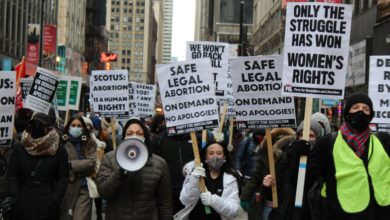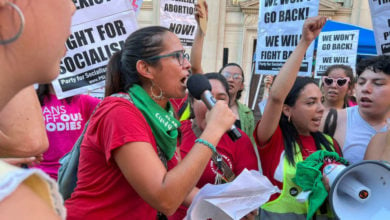The struggle to defend abortion rights in Kentucky is reaching a decisive point after a series of legislative maneuvers and now a federal court order on the fate of the reactionary “House Bill 3”. On April 13, all abortion services after the 15th week of pregnancy were effectively banned in Kentucky following the passage of the sweeping HB3 ‘omnibus’ law. The bill was initially vetoed by Governor Andy Beshear in early April, but the state legislature swiftly overrode the veto last week.
After the veto was overridden by the right wing dominated General Assembly, lawsuits were immediately filed by the ACLU and Planned Parenthood. Planned Parenthood denounced HB3 for what it is, “a de facto ban on all forms of legal abortion.” In response to these efforts in court, a federal judge issued a ruling temporarily preventing parts of the law from going into effect.
But this freeze is only set to last two weeks as the court carries out a full proceeding to determine the legality of HB3. This lower court ruling could then be appealed to higher levels of the federal legal system. It is a myth that the courts are “above politics” and not influenced by broader events in society. Now is the critical moment when a fighting people’s movement can defeat this attack on abortion rights through mass action.
Kentuckians fight back for abortion rights
The bill had an “emergency” clause which initially put the law into effect immediately, forcing the only two abortion providers in the state to suspend abortion care the following day. For a full week between the override of the veto and the federal judge’s temporary injunction, abortion was completely inaccessible in Kentucky – a glimpse of what the right wing hopes the future will look like permanently. Even with the court order, the 15-week ban remains in effect pending further court action.
The extensive restrictions in HB3 include:
- A total ban on abortions performed beyond 15 weeks
- A total ban on abortion telemedicine – despite the well-proven safety and efficacy of at-home abortion medication – in a mostly rural state where the only two abortion clinics were already inaccessible to most people
- A requirement that all patients must file “birth-death” certificates, even in cases of natural miscarriage, which will be entered into public record
- A requirement that all “fetal remains” be buried or cremated, making abortion even more cost-prohibitive
- Further restrictions on minors seeking abortion care
- Increased regulations on healthcare providers and the companies which produce abortion medicine, including a public database of abortion providers’ names and addresses
PSL Louisville joined reproductive justice advocates at the State Capitol on April 13th to protest the imminent vote overturning the veto of HB3. For hours, working-class Kentuckians rallied outside the chambers determined to disrupt the proceedings and provide a political voice for their class that was otherwise sorely lacking within the halls of power.
“The minority of the population – which is the super wealthy – gets to pick our representatives who then, in turn, make all of the decisions for all of Kentucky based on what those few want,” said Sheila Foy, who took the day off work to drive to Frankfort and protest the bill. “It’s disgusting.” Ailiyah Alim, also a protester at the capitol on April 13, said, “I think it’s important to show up and say something, even if you’re not being listened to by your government because all injustice is connected.”
The fight continues
HB3 is only one part of an all-out assault on abortion rights. Kentucky already passed a trigger law in 2019, and an anti-abortion amendment to the state constitution will be on the ballot in November. In the days since the ‘omnibus’ bill became Kentucky state law, Florida’s government passed another harsh bill similarly banning abortion after fifteen weeks. This year, the US Supreme Court will rule on the case of Dobbs v. Jackson Women’s Health Organization, which directly challenges Roe v. Wade.
Not even two months ago, the Women’s Health Protection Act (WHPA) came up for its first vote in the Democratic Party-controlled U.S. Senate after finally passing the U.S. House of Representatives. If passed, the bill would have ensured a federal right to abortion up to fetal viability (around 24 weeks) and overridden all manner of reactionary state restrictions on the procedure. However, the bill was defeated 46-48 without even full Democratic support, much less the political will to overturn the filibuster.
Contrary to the prevailing narrative, abortion rights were not gifted by an enlightened all-male Supreme Court in 1973; they were a hard-fought concession won after years of organizing and mass struggle carried out primarily by working women. We will not go back! We will fight back!





